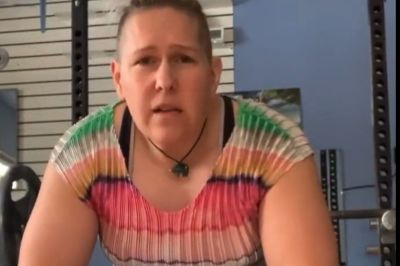Male athlete breaks women's powerlifting record during championship: 'Completely unfair'

A male athlete who competes as a woman and previously criticized female powerlifters recently set a national record in the women's bodybuilding division during a championship competition, where he also beat several female athletes for the first-place award.
Anne Andres, a 40-year-old male that identifies as a female, participated in the Canadian Powerlifting Union's 2023 Western Canadian Championship on Sunday at Brandon University's Healthy Living Centre.
As Reduxx reported Monday, Andres competed in the Female Masters Unequipped category, and the advanced results obtained by the outlet showed that the male athlete's powerlifting score was 400 pounds more than the top-performing female powerlifter. Andres secured first place over female powerlifters Michelle Kymanick and SuJan Gil.
According to the report, Andres' total means that he would've ranked among the top-performing male athletes if he had competed in the men's division. A source also informed Reduxx that the male athlete set a Canadian women's national record and an unofficial women's world powerlifting record.
Andres shared a video Monday on Instagram of him standing on the first-place podium during a ceremony to receive his first-place award. The video also showed two female athletes standing beside him on the podiums reserved for second and third place. In the same Instagram post, the male powerlifter shared videos of him competing and lifting heavy weights.
"Today I did some lifting. Not just some lifting. I got to lift with friends from across Canada," Andres wrote. "Friends who welcome me and love me and want me to be there. Friends who support trying to be the best me. I couldn't ask for more than that, could I?"
The championship was held under the umbrella of the Canadian Powerlifting Union. In February, CPU released its "Trans Inclusion Policy," which followed guidelines from the Canadian Centre for Ethics in Sport (CCES) by allowing men who identify as women to compete in the female powerlifting category.
April Hutchinson, a female powerlifter within the Canadian Powerlifting Union, criticized the decision to allow Andres to compete against females in an interview with TalkTV. She called the policy "completely unfair."
"It's been very disheartening' to see Andres beat the record," Hutchinson said. "Athletes have been chasing that for years. And we're talking top athletes who have been training and training and training."
Hutchinson added that some female competitors quit the competition when they learned a biological male would participate.
"My boyfriend could basically walk in tomorrow, identify as a female, compete, and then the next day, go back to being a man again," Hutchinson said, according to The New York Post. "No proof, no ID required, just basically going on how you feel that day or whatever gender you want."
Women's sports advocate Riley Gaines Barker tweeted a video of Andres questioning why the women's division for powerlifting is "so bad."
"I mean, not compared to me," the male athlete said. "We all know that I'm a tranny freak, so that doesn't count. … I mean, standard bench in powerlifting competition for women, I literally don't understand why it's so bad."
Barker, an outspoken critic of allowing men to compete in women's sports, responded to the video by pointing out that Andres is a man and suggested that his male sex hormones provide him with an advantage.
Barker is a former collegiate swimmer and University of Kentucky graduate who has spoken about her experience competing against Lia (Will) Thomas, a trans-identified biological man allowed to compete on the University of Pennsylvania women's swim team after three seasons of competing on the men's team.
During a June U.S. Senate Judiciary Committee hearing, Barker testified about how the NCAA forced women to share a locker room with Thomas and allowed him to compete and become an All-American, an honor that would have otherwise gone to a female athlete.
The former collegiate swimmer competed against Thomas in the 200-yard freestyle race during the 2022 NCAA national championship, tying with him for fifth place. Despite placing the same as the male athlete, the NCAA informed Barker that she would have to go home "empty-handed" while Thomas received a trophy.
"I felt betrayed; I felt belittled. I felt reduced to a photo-op," she continued. "But my feelings didn't matter. What mattered to the NCAA were the feelings of a biological male."
Some powerlifting federations have enacted policies prohibiting biologically male competitors from competing in women's competitions. Among those is USA Powerlifting, which notes that males, on average, have "increased body and muscle mass, bone density, bone structure, and connective tissue."
In March, a judge in Minnesota ruled that the USA Powerlifting policy violated the state discrimination law because it banned trans-identified males from competing in the women's division. USA Powerlifting will appeal the decision but updated its policy to indicate that "USA Powerlifting Transgender Policy does not apply to [Minnesota] competitions."
Samantha Kamman is a reporter for The Christian Post. She can be reached at: samantha.kamman@christianpost.com. Follow her on Twitter: @Samantha_Kamman




























